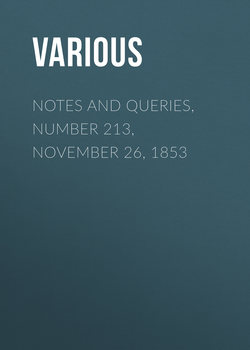Читать книгу Notes and Queries, Number 213, November 26, 1853 - Various - Страница 4
Notes
FOLK LORE
ОглавлениеDerbyshire Folk Lore.—Many years ago I learned the following verses in Derbyshire, with reference to magpies:
"One is a sign of sorrow; two are a sign of mirth;
Three are a sign of a wedding; and four a sign of a birth."
The opinion that a swarm of bees settling on a dead tree forebodes a death in the family also prevails in Derbyshire.
In that county also there is an opinion that a dog howling before a house is an indication that some one is dying within the house; and I remember an instance where, as I heard at the time, a dog continued howling in a street in front of a house in which a lady was dying.
It is also a prevalent notion that if the sun shines through the apple-trees on Christmas Day, there will be an abundant crop the following year.
I never heard the croaking of a raven or carrion crow mentioned as an indication of anything, which is very remarkable, as well on account of its ill-omened sound, as because it was so much noticed by the Romans.
S. G. C.
Weather Superstitions.—If it rains much during the twelve days after Christmas Day, it will be a wet year. So say the country people.
"If there is anything in this, 1853 will be a wet year, for it has rained every day of the twelve." So wrote I under date January 9.
No one, I think, will deny that for once the shaft has hit the mark.
R. C. Warde.
Kidderminster.
Weather Rhymes, &c.—The following are very common in Northamptonshire:
"Rain before seven,
Fine before eleven."
"Fine on Friday, fine on Sunday.
Wet on Friday, wet on Sunday."
"The wind blows cold
On Burton Hold (Wold).
Can you spell that with four letters?
I can spell it with two."
Burton Hold, or Wold, is near Burton Latimer.
B. H. C.
Folk Lore in Cambridgeshire (Vol. viii., p. 382.).—The custom referred to by Mr. Middleton, of ringing the church bell early in the morning for the gleaners to repair to the fields, and again in the evening for their return home, is still kept up not only at Hildersham, but also in most of the villages in this neighbourhood. I have heard this "gleaners' bell" several times during this present autumn; the object of course being to give all parties a fair and equal chance. Upon one occasion, where the villages lie rather close together, I heard four of these bells sounding their recall from different church towers; and as I was upon an eminence from whence I could see the different groups wending their way to their respective villages, it formed one of the most striking pastoral pictures I have ever witnessed, such, perhaps, as England alone can furnish.
Norris Deck.
Cambridge.
